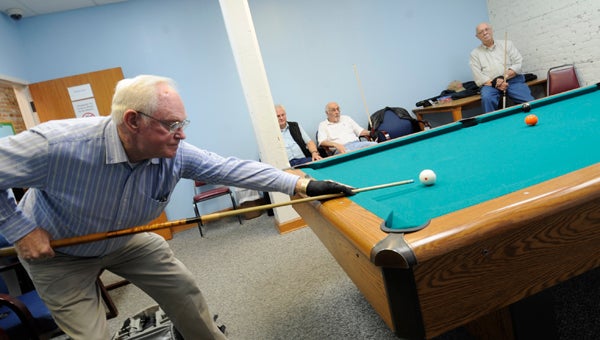City wants county to provide money for some city programs
Published 6:51 pm Friday, March 25, 2016

VAIL STEWART RUMLEY
POPULAR FACILITY: The Grace Martin Harwell Senior Center, operated by the City of Washington, is popular with area residents, including many who live outside the city limits. The city is seeking county dollars to help pay for providing the services and programs the center offers. Here, Joe Puryear takes a shot during a recent afternoon game of pool at the senior center.
Washington is asking Beaufort County for a little more than $1.3 million in county dollars for the upcoming fiscal year, which begins July 1.
There is no guarantee the county will honor that request.
The city wants the county to provide its “fair share” of funding for city services, programs and facilities that benefit county residents who are not Washington residents. In previous years, such requests for funding were made more or less on an informal basis. This year, the city submitted formal requests for the money — after the county required that formality, according to City Manager Bobby Roberson.
To that end, the city submitted forms detailing the amounts being sought and why the county should provide funding. The city is seeking $1,323,490 to help pay for operating the city-owned Brown Library, the city-run Grace Harwell Martin Senior Center, the city-run Hildred T. Moore Aquatic Center and the city’s recreation facilities.
The breakdown of the request is $539,488 for recreation facilities, $357,263 for the aquatic center, $293,822 for the library and $132,917 for the senior center.
Data contained in the forms indicate that more Beaufort County residents who are not city residents used the library, senior center, aquatics center and recreation facilities than Washington residents in recent years. According to one of the forms, during the 2014-2015 fiscal year, 2,070 people used the senior center, with 850 of them living in the city, 1,113 of them living in the county but outside the city and the remaining 107 people lived outside the county. That means 53.7 percent of people who used the senior center lived in the county but not in the city.
County Manager Brian Alligood makes it clear the county commissioners are the final arbiters when it comes to determining the fate of the city’s funding requests, which they have not seen yet.
“They don’t have the recommended budget yet. … We’ll do a continuation budget, and we’ll do a service expansion budget. We’re not giving them all the information yet. It will be included in the recommended budget,” said Alligood, who develops the recommended budget with help from county staff. The commissioners are scheduled to take up outside agency funding requests (expansion or current funding or new funding requests) May 24, Alligood said.
Any outside agency that received funding from the county for the current fiscal year will be put down for that amount in the continuation budget (basically a replication of the current budget), Alligood said. Any request for an increase in county funding from a currently funded agency or funding request from a new entity (such as the city) will be included in the proposed service-expansion budget. As for the currently funded agencies, the requested increase will be included in the service-expansion budget. Their current allocations will be included in the continuation budget. So, if an agency is receiving $5,000 currently and is seeking an additional $1,000 for the next fiscal year, the requested $1,000 increase goes in the service-expansion budget, with the remaining $5,000 placed in the continuation budget.
“The applicant is the one who gets to justify (its request). I would look at it as it’s not fair for me to try to sell your program for you. I may not being selling the right thing,” Alligood said about outside agencies seeking county dollars.
Alligood believes the city’s detailed funding requests will be helpful to the commissioners in deciding what county dollars, if any, the county will allocate to the city. Alligood, who was the city manager before becoming county manager, said his time as city manager provides him a better understanding of what the city wants to accomplish with its funding requests.
“We’re a public-service organization, and they are, too. Subsequently, we like to provide services for all citizens of Beaufort County, but we have to do it at reasonable cost,” Roberson said. “We’re not trying to make any money, but we’re certainly trying to break even. The activities that we are currently doing for the city of Washington and Beaufort County, the number of individuals who are participating in the programs — the majority of them are outside the city limits. In essence, our request to the county is to help us provide those services at the same level we’ve been providing them over the past three to five years.”
The city believes it had no choice but to seeking county funding, Roberson said.
“We felt like if we didn’t submit the requests that, in turn, the county would say, ‘We don’t know what the city wants or what they need because they haven’t submitted an application in compliance with our request,” Roberson said. “So, we would be treated like any other outside agency requesting funding.”
“If they could give us just a portion, it’s much better than not having anything at all,” Roberson added. “I’m not sure they would fund the entire amount, but we’ve got to be in a position for them to consider that.”
“It’s a policy decision by the board,” Alligood said about how the commissioners would handle the four funding requests from the city. “In looking at those, I think what helps sway one way or the other is it a service … the city is providing that benefits everybody, and is there a way to differentiate that?”
Some of the funding requests could be more palatable to the commissioners than other funding requests.
“If you look at the senior center, the senior center — it’s being provided by the city — it’s clearly serving city residents and it’s clearly serving county residents. Could the city say, ‘Well, I’m sorry, you’re a county resident. You have to pay more or you have to pay to use this service. … Can they do that? They can’t. The state doesn’t allow you to do that,” Alligood said. “So, from my perspective … it’s very justifiable to say, “We’ve got people in the county who are participating. We can’t offset that cost by charging them more because the state won’t allow us. That provides, I think, some justification that we ought to look at that.”
Alligood said the city likely would face some opposition when it comes to the county providing money to help operate and maintain the aquatics complex because it derives some of its revenue from paid memberships, which are available to people outside the city and the county. Alligood said county residents who do not live in the city but pay for pool memberships might not like some of their tax dollars going toward pool-related expenses, considering that double dipping.
Roberson believes the city is making a strong case for receiving county dollars. “An example of this — we’re proud of the senior center. It’s probably one of the best ones for a population of our size. If you go back and take a look at it, we’re one of the only cities that provide that kind of facility for our senior citizens. … We’re just asking them (county), if they would help us do it, we can maintain the same level of service. Otherwise’ we’ve got to look at decreasing some of our costs and expenses in the upcoming years,” he said.
Usage of Washington facilities:
Brown Library usage for FY 2014-2015
Washington residents — 5,108 (33 percent)
Beaufort County residents — 10,339 (66 percent)
Residents of other counties — 171 (1 percent)
Total residents — 15,618
Senior center usage for FY 2014-2015
Washington residents — 850 (41 percent)
Beaufort County residents — 1,113 (54 percent)
Residents of other counties — 107 (5 percent)
Total residents — 2,070
Aquatics center usage for FY 2014-2015
Washington residents — 354 (36 percent)
Beaufort County residents — 541 (54 percent)
Residents of other counties — 102 (10 percent)
Total residents — 997
Recreation facilities usage for FY 2014-2015
Washington residents — 825 (46.4 percent)
Beaufort County residents — 952 (53.6 percent)
Total residents — 1,777
Note: Beaufort County residents refers to Beaufort County residents who do not live in Washington. Data compiled by City of Washington.






